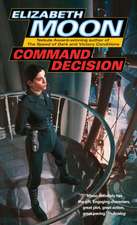Trading In Danger: Vatta's War
Autor Elizabeth Moonen Limba Engleză Paperback – 19 sep 2019
| Toate formatele și edițiile | Preț | Express |
|---|---|---|
| Paperback (3) | 49.98 lei 3-5 săpt. | +26.83 lei 7-13 zile |
| Little Brown Book Group – 19 sep 2019 | 49.98 lei 3-5 săpt. | +26.83 lei 7-13 zile |
| Del Rey Books – 31 iul 2004 | 53.97 lei 3-5 săpt. | |
| Little Brown Book Group – 6 noi 2003 | 73.13 lei 3-5 săpt. | +9.27 lei 7-13 zile |
Preț: 49.98 lei
Preț vechi: 64.42 lei
-22% Nou
Puncte Express: 75
Preț estimativ în valută:
9.56€ • 10.01$ • 7.91£
9.56€ • 10.01$ • 7.91£
Carte disponibilă
Livrare economică 15-29 martie
Livrare express 01-07 martie pentru 36.82 lei
Preluare comenzi: 021 569.72.76
Specificații
ISBN-13: 9780356514338
ISBN-10: 0356514331
Pagini: 432
Dimensiuni: 126 x 196 x 30 mm
Greutate: 0.3 kg
Editura: Little Brown Book Group
Seria Vatta's War
ISBN-10: 0356514331
Pagini: 432
Dimensiuni: 126 x 196 x 30 mm
Greutate: 0.3 kg
Editura: Little Brown Book Group
Seria Vatta's War
Notă biografică
Elizabeth Moon
Extras
Chapter One
Kylara Vatta came to attention in front of the Commandant’s desk. One sheet of flatcopy lay in front of him, the print too small for her to read upside down. She had a bad feeling about this. On previous trips to the Commandant’s office, she had been summoned by an icon popping up on her deskcomp. Those had all been benign visits, the result of exams passed in the top 5 percent, or prizes won, and the Commandant had greeted her with the most thawed of his several frosty expressions.
Today it had been “Cadet Vatta to the Commandant’s office, on the double,” blaring out over the speaker right in the middle of her first class period, Veshpasir’s lecture on the history of the first century pd. Veshpasir, no friend to shipping dynasties, had given her a nasty smirk before saying, “Dismissed, Cadet Vatta.”
She had no idea what this was about. Or rather, she hoped she didn’t. Surely she had been careful enough . . .
“Cadet Vatta,” the Commandant said. No thawing at all, and his left eyelid drooped ominously.
“Sir,” she said.
“I won’t even ask what you thought you were doing,” he said. “I don’t want to know. I don’t care.”
“Sir?” She hated the squeak in her voice.
“Don’t play the innocent with me, Cadet.” Rumor had it that if his left eyelid actually closed, cadets died. She wasn’t sure she believed that, but she hoped she wasn’t about to find out. “You are a disgrace to the Service.”
Ky almost shook her head in confusion. What could he be talking about?
“Going outside the chain of command like this”—he thumped the sheet of paper—“embarrassing the Service.”
“Sir—” She gulped, caught between the etiquette that required silence until she was given leave to speak, and a desperate need to find out what had the Commandant’s eyelid hovering ever nearer to its mate.
“You have something to say, Cadet?” the Commandant asked. His voice, like his face, might have been carved out of a glacier. “Do go ahead . . .” It was not a generous offer.
“Sir, with the greatest respect, this cadet does not know to what the Commandant is referring . . .”
His lips disappeared altogether. “Oh, you can play the innocent all you want, Cadet, and maintain that formal folderol, but you don’t fool me.” He paused. Ky searched her memory, and came up empty. “Well, since you insist, let’s try this: do you recall the name Mandy Rocher?”
“Yes, sir,” Ky said promptly. “Second year, third squad.”
“And you can think of no reason why I might connect that name and yours?”
“Sir, I helped Cadet Rocher locate a Miznarii chaplain last weekend, when Chaplain Oser was away . . .” A dim glimmer of what might be the problem came to her but she couldn’t believe there would be that much fuss about a simple little . . .
“And just how did you locate a Miznarii chaplain, Cadet?”
“I . . . er . . . called my mother, sir.”
“You called your mother.” He made it sound obscene, as if only the lowest criminal would call a mother. “And told your mother to do what, Cadet?”
“I asked her if her friend Jucha could refer me to a Miznarii chaplain near the Academy.”
“For what reason?”
“I told her that one of the underclassmen was overdue for confession and the Academy chaplain was out of town.”
“You didn’t tell her what he wanted to confess?”
Ky felt her own eyebrows going up. “Sir, I don’t know what he had to confess. I only know that he was in distress, and needed a chaplain, and I thought . . . I thought it would save trouble if I just got him one.”
“You’re not Miznarii yourself . . . ?”
“No, sir. We’re Modulans.” Actually, they were Saphiric Cyclans, but that was such a small sect that nobody recognized it, and Modulans were respectable and undemanding. You could be a Modulan without doing anything much at all, a source of some humor to more energetic sects. Ky found Modulan chapel restful and had gone often enough to acquire a reputation for moderate piety—the level most approved by Modulans.
“Hmmph.” The Commandant’s eyelid twitched upward a millimeter; Ky hoped this was a good sign. “You had no idea that what he wanted to confess concerned the honor of the Service?”
Her jaw dropped; she forced it back up. “No, sir!”
“That he made a formal complaint to this Miznarii, in addition to his confession, which the chaplain took immediately to the Bureau of War, where it fell into the hands of a particularly noxious bureaucrat whose sister just happens to be on the staff of Wide Exposure, so that I found myself on the horn very early this morning with Grand-Admiral Tasliki, who is not amused at all . . . ?” It was not really a question; it was rant and explanation and condemnation all in one. “The bureaucrat spoke on Wide Exposure’s ‘Night Affairs’ program at 0115—clever timing, that—and this morning all the media channels had something on it. That’s only the beginning.”
Ky felt hot, then cold, then hot again. “S-sir . . .” she managed.
“So even if you did not know, Cadet Vatta, what Cadet Rocher wanted to confess, you may be able to grasp that by going outside the chain of command you have created a very very large public rela- tions problem, embarrassing the entire general staff, the Bureau of War, and—last but not least—me personally.”
“Yes, sir.” She could understand that. She could not, she thought, have anticipated it, and now she was consumed by curiosity: what, exactly, had Mandy Rocher said? They weren’t allowed access to things like Wide Exposure except on weekends.
“You are an embarrassment, Cadet Vatta,” the Commandant said. “Many, many people want your hide tacked on the wall and your head on a pike. The only reason I don’t—” His eyelid was up another millimeter. “The only reason I don’t, is that I have observed your progress through the Academy and you have so far been, within the limits of your ability, an exemplary cadet. When I thought you’d done it on purpose I was going to throw you to the wolves. Now—since I suspect that you simply fell for a sob story and your entire barracks knows you have a soft spot for underdogs and lost lambs—I’m simply going to take the hide off your back in strips and see your resignation on my desk by 1500 hours this afternoon.”
“S-sir?” Resignation . . . did that mean what it sounded like? Was he kicking her out? Just because she’d tried to help Mandy?
Now the eyelid came all the way back up. “Cadet Vatta, you have—unwittingly, perhaps—created a major mess with implications that could damage the Service for years. Your ass is grass, one way or the other. You could be charged, for instance, with that string of articles beginning with 312.5—I see by your expression that you have, belatedly, remembered them . . .”
She did indeed. Article 312.5 of the Military Legal Code: failure to inform superior officer in a timely manner of potentially harmful personnel situations. Article 312.6: failure to inform superior officer in a timely manner of breaches of security involving sensitive personnel. Article 312.7: failure to inform superior officer in a timely manner of . . . rats, rats, and flying rats. She was majorly doomed.
“I . . . wasn’t thinking, sir.” That was not an attempt at apology, merely a statement of fact.
“Fairly obvious. What did you think might happen?”
“I thought . . . Mandy—Cadet Rocher—was so upset that day—I thought if he could see a chaplain and confess or whatever, he’d settle down until the regular chaplain got back. He had those exams coming up, and they were group-graded; if he didn’t do well, his squad would suffer for it . . .”
“What you don’t know, Cadet, is that Rocher had been avoiding the regular chaplain’s cycle; his so-called emergency was of his own making. He wanted to talk to someone outside the Academy, and you made that possible.”
“Yes, sir.”
“And you didn’t tell anyone at all about this, did you?”
“No, sir.”
“Easier to get forgiveness than permission, is that what you were thinking?”
“No, sir . . . not really.” One of the places where Modulans and Saphiric Cyclans disagreed was about the giving of aid. Modulans felt that moderate assistance should be moderately public—one did not make a huge display of charity, but one allowed others to know charity was going on, to set a good example. Saphiric Cyclans, on the other hand, believed that all help should be given as anonymously as possible. Now was probably not the time to talk about that difference.
“I am so reassured.” The Commandant’s eyelid quivered. “Cadet Vatta, it is unfortunate that you have to suffer for a generous impulse, but we need naval officers with brains as well as kind hearts. You will not return to class. You will, as I said, present a letter of resignation which does not mention any of this, and cites personal reasons as the cause, by 1500 hours. Sooner, Cadet, is better than later, but first you will go to Signals, and make contact with your family, so that you will be able to leave quietly and quickly when that resignation is approved.” The look he gave her now was warmer by a few degrees, but still not cordial. “Staff will pack up your things; they will be at the gate when you depart.”
“I . . . yes, sir.”
“And yes, you infer correctly that you are not to speak to any of your former associates. Your departure will be explained as seems most expedient for the Service.”
“Sir.” Not speak to anyone. Not to Mira or Lisette . . . not to Hal. Only another few months, and we can—but not now, not ever. Please, please, let no one figure out . . .
“You are dismissed.”
“Sir.” Ky saluted, rotated correctly on her right heel, and left his office, her mind a blur. Signals. She knew where Signals was. She passed without really seeing an enlisted man in the passage, and another at the head of the stairs down to the classroom level. Halfway to Signals, her mind clicked on long enough to panic . . . She had to call her family, tell her father and, oh heavens, her mother that she was disgraced, dismissed . . . Her brothers would all . . . her cousins . . . Uncle Tomas . . . Aunt Grace, worse than Uncle Tomas, who would say again all she had said when Ky first went to the Academy, laced with I told you so . . .
She felt the tremor in her hands, and fought to still it. Now, for this short period of time, she was still a cadet, and now, for this short period of time, she would act like one. Even as the dream went down in smoke and ashes, even then . . . her stomach looped wildly once and settled.
At the door of Signals, a uniformed guard stared past her.
“Cadet Vatta, on order of the Commandant,” she said.
He stepped aside, and she heard him murmur into his comunit “Cadet Vatta at Signals, sir.”
Commander Terry had the watch in Signals; his expression suggested that her family were loathsome toads, and she was toad spawn. “Vatta,” he said, minus the honorific.
“Sir.”
“Which contact number?” As if having more than one number were also a crime.
“Vatta Enterprises,” Ky said. “They have a relay—” Wherever her father was, they could reach him, or give her a link to the senior Vatta onplanet.
“We would prefer that you make a direct call.”
She knew her father’s mobile number, of course, but he’d often said he hated the damned thing, and would leave it on the bedside table as often as not. That meant her mother might pick it up, the last per- son she wanted to talk to. Vatta Enterprises would ring his skullphone, which he couldn’t take off. She didn’t have that number; no one did but the communications computer at VE.
She rattled off the string for the mobile, and mentally visualized the arc of blue, best fortune, of the Saphiran Cyclan wheel, as Commander Terry nodded to the rating who entered the string.
“Name?” Terry asked abruptly. Ky startled. “The name of the person you are calling,” he said.
“Sir, my father, sir. Gerard Avondettin Vatta. But if my mother—”
“You are permitted one call, to one recipient, Cadet Vatta.” Commander Terry picked up the headset and held the receiver to his ear. Ky waited, the blue arc fading in her mental eye. Then his hand twitched. “This is Commander Terry at the Naval Academy; I need to speak to Gerard Avondettin Vatta.” A pause, then: “Kylara Vatta will speak with you.” He held the headset out to Ky.
She was not even allowed to speak from a privacy booth. She had known the call would be recorded, but at least a semblance of normal courtesy would have helped. She could feel tears swelling now, stuffing her nose. She fought for calmness as she took the headset and put it on. Enough of this; she turned her back on Commander Terry without permission.
“Dad, listen—”
From the Hardcover edition.
Recenzii
PRAISE FOR ELIZABETH MOON
HERIS SERRANO
“Dazzling . . . The characters spring to life on the page. . . . The action never flags. . . . Riveting.”
–Booklist
“Excellent world building and appealing characters.”
–Science Fiction Age
AGAINST THE ODDS
“Readers will delight in the twisting, thorny adventure in the compelling continuation to this popular series.”
–Publishers Weekly
“A fun fast-paced mix of space and soap opera.”
–Locus
CHANGE OF COMMAND
“Fans will relish the clever intrigue, the outstanding characterization and a perfectly applied dash of humor.”
–Romantic Times
“Political intrigue, mutiny in space, and ideological battles of war and weapons lend variety to this fast-moving space opera set in the distant future.”
–Library Journal
From the Hardcover edition.
HERIS SERRANO
“Dazzling . . . The characters spring to life on the page. . . . The action never flags. . . . Riveting.”
–Booklist
“Excellent world building and appealing characters.”
–Science Fiction Age
AGAINST THE ODDS
“Readers will delight in the twisting, thorny adventure in the compelling continuation to this popular series.”
–Publishers Weekly
“A fun fast-paced mix of space and soap opera.”
–Locus
CHANGE OF COMMAND
“Fans will relish the clever intrigue, the outstanding characterization and a perfectly applied dash of humor.”
–Romantic Times
“Political intrigue, mutiny in space, and ideological battles of war and weapons lend variety to this fast-moving space opera set in the distant future.”
–Library Journal
From the Hardcover edition.






















